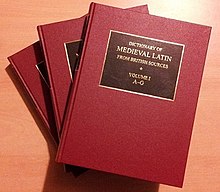The Dictionary of Medieval Latin from British Sources ("DMLBS") is a lexicon of Medieval Latin published by the British Academy. The dictionary is not founded upon any earlier dictionary, but derives from original research. After decades of preparatory work, work on the dictionary itself was begun in 1965, and it was published in fascicules between 1975 and 2013. In 2016 the complete work was put online. A consolidated reprint in three volumes was published in 2018.
 2018 edition | |
| Editors |
|
|---|---|
| Language | English |
| Publisher | Oxford University Press for the British Academy |
Publication date | 2018 (1st ed. 1975 to 2013) |
| Publication place | United Kingdom |
| Media type | Print and online |
| ISBN | 978-0-19-726633-5 |
| 473/.21 | |
| LC Class | PA2891 |
History
editIn 1913, Robert Whitwell, a prolific contributor to the Oxford English Dictionary,[1] petitioned the British Academy to use the imminent International Congress of Historical Studies to propose a replacement for the standard dictionary of medieval Latin, Du Cange's Glossarium (1678).[2] Whitwell's idea was taken up in 1920 by the new International Union of Academies, which decided in 1924 that member academies should produce dictionaries based on those medieval Latin texts produced in geographic areas corresponding to their respective present-day territories, whilst also furnishing the material for an international Novum Glossarium.[3] To this end, the British Academy appointed two committees to direct the collection of quotations, one covering the sixth to eleventh centuries for the Novum Glossarium and the other covering 1066 to 1600 for a dictionary of "late medieval British Latin".
By 1932 the academy felt that they could usefully publish the first fruits of the project, which appeared in 1934 as the Medieval Latin Word-List from British and Irish Sources, prepared by J. H. Baxter and Charles Johnson.[4] A Revised Word-List prepared by Ronald Latham appeared in 1965.[5]
Print publication history
editThe DMLBS was published in printed fascicules, from 1975 to 2013, by Oxford University Press:
- I: A–B (R. E. Latham), 17 April 1975, ISBN 978-0-19-725948-1
- II: C (R. E. Latham), 14 May 1981, ISBN 978-0-19-725968-9
- III: D–E (R. E. Latham, D. R. Howlett, et al.), 26 June 1986, ISBN 978-0-19-726023-4
- IV: F–G–H (D. R. Howlett, A. H. Powell, et al.), 14 December 1989, ISBN 978-0-19-726082-1
- V: I–J–K–L (D. R. Howlett), 21 August 1997, ISBN 978-0-19-726148-4
- VI: M (D. R. Howlett, J. Blundell, et al.), 3 January 2002, ISBN 978-0-19-726240-5
- VII: N (D. R. Howlett), 30 May 2002, ISBN 978-0-19-726266-5
- VIII: O (D. R. Howlett), 29 January 2004, ISBN 978-0-19-726300-6
- IX: P–Pel (D. R. Howlett), 24 November 2005, ISBN 978-0-19-726340-2
- X: Pel–Phi (D. R. Howlett), 18 January 2007, ISBN 978-0-19-726387-7
- XI: Phi–Pos (D. R. Howlett), 13 December 2007, ISBN 978-0-19-726421-8
- XII: Pos–Pro (D. R. Howlett), 26 March 2009, ISBN 978-0-19-726436-2
- XIII: Pro–Reg (D. R. Howlett), 28 October 2010, ISBN 978-0-19-726467-6
- XIV: Reg–Sal (D. R. Howlett), 8 December 2011, ISBN 978-0-19-726508-6
- XV: Sal–Sol (D. R. Howlett, R. K. Ashdowne), 26 July 2012, ISBN 978-0-19-726528-4
- XVI: Sol–Syr (R. K. Ashdowne, D. R. Howlett), 19 February 2013, ISBN 978-0-19-726545-1
- XVII: Syr–Z (R. K. Ashdowne), 19 December 2013, ISBN 978-0-19-726561-1
A binding case for the first five fascicules was supplied with Fascicule V, forming a first volume (A–L). However, no further binding cases were issued.
In 2018 a three-volume consolidated edition was published incorporating additions and corrections, including those previously published, into the text.
Publication online
editIn 2016 the whole DMLBS was published online, under licence from the British Academy. The Logeion version is free and is searchable by headword only.[6] The Brepols version, available by subscription, is more fully searchable.[7]
See also
editReferences
edit- ^ Gilliver, Peter. "Biographical Information". Oxford English Dictionary. Retrieved 19 October 2013.
- ^ Robert Jowitt Whitwell, "Mediaeval Latin", letter to The Spectator, 1 February 1913.
- ^ Union Académique Internationale project page Archived 24 March 2012 at the Wayback Machine Retrieved 2011-09-11
- ^ James Houston Baxter and Charles Johnson, "Introduction", Medieval Latin Word-List from British and Irish Sources.
- ^ Ronald E. Latham, Revised Medieval Latin Word-List from British and Irish Sources (1965).
- ^ Logeion online version (announcement).
- ^ Brepolis online version (announcement).
Further reading
edit- Ashdowne, Richard (2014). "Dictionary of Medieval Latin from British Sources". British Academy Review. 24: 46–53.
- Ashdowne, R.K. (2010). "'Ut Latine minus vulgariter magis loquamur': The making of the Dictionary of Medieval Latin from British Sources". In Christopher Stray (ed.). Classical dictionaries: past, present and future. London: Duckworth. pp. 195–222. ISBN 9780715639160.
- Howlett, David (2017). "Making the Dictionary of Medieval Latin from British Sources". In Richard Ashdowne; Carolinne White (eds.). Latin in Medieval Britain. Proceedings of the British Academy 206. London: British Academy/OUP. pp. 341–349. ISBN 9780197266083.
- Latham, R.E. (1957). "Suggestions for a British-Latin Dictionary". Archivum Latinitatis Medii Aevi. 27 (2): 189–229. doi:10.3406/alma.1957.1381. hdl:2042/3073. S2CID 211517160.
- Sharpe, Richard (1995). "Modern Dictionaries of Medieval Latin". In Jacqueline Hamesse (ed.). Bilan et perspectives des études mediévales en Europe: actes du premier Congres européen d'études médievales (Spoleto, 27-29 mai 1993). Textes et études du moyen âge. Louvain-la-Neuve: Fédération Internationale des Instituts d'Études Médiévales. pp. 289–304.
External links
edit- Logeion has a complete, free copy of Dictionary of Medieval Latin from British Sources ("DMLBS"), searchable by headword.
- Dictionary of Medieval Latin from British Sources project website
- Dictionary of Medieval Latin from British Sources project blog
- Quisquiliae, notes from an Assistant Editor on the Dictionary of Medieval Latin from British Sources